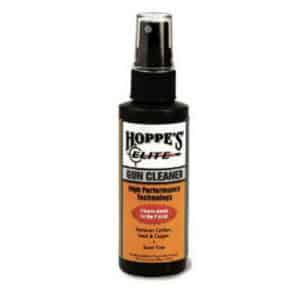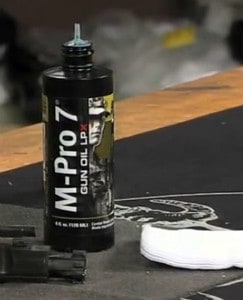WD-40. It seems like it’s been around forever. Your dad used it, your grandpa used it, and your great grandpa probably used it as well. I’m sure all of you can remember an old dirty can of the stuff sitting out in the garage, ready to spring into action anytime something got stuck or needed a little lubrication. Naturally, WD-40 seems like the go-to chemical for cleaning guns. This couldn’t be further from the truth. Many people ask the question, “Can I clean my guns with WD-40?” The short answer to this question is no. The long answer is nooooooooooo. For a bit more explanation, let’s take a bit of a peek into the history of WD-40 and what it was designed to do.
Related Articles:
- Learn Here: Gun Lubrication 101 [Know Your Stuff]
- Gunk? How to Remove Rust From a Gun [Clean]
- Easy! How to Store Guns to Prevent Rust [Eliminate Moisture]
- Safety First! How to Use a Gun Cleaning Kit [Instructions]
- Don’t Overdo It! Can Guns be Over Cleaned? [Right Tools]

Related Buyers Guides:
Where Did WD-40 Come From?
About 65 years ago, a very small business called Rocket Chemical Company decided to attempt to make a chemical solvent that would also prevent rust, primarily to be used to control rust on aircrafts and rockets. On the 40th attempt, they finally got their water displacing formula right, hence the name WD-40 (water displacer, 40th attempt). Its first major use was by Convair, who used it on the Atlas missile. 5 years later, in 1958 the product was first marketed to consumers on store shelves. From there, the company exploded, finally going public on the stock market in 1973. Today, roughly 80% of homeowners and professionals use WD-40, and its formula still remains a secret today.
What Does WD-40 Do?
Contrary to popular belief, WD-40 is NOT a lubricant. Many people use it to break free rusted bolts, but that does not make it a lubricant. What WD-40 does is very obvious, and is even clearly stated right in the name: it is a water displacing solvent. It does a fairly decent job of dissolving corrosion, keeping water away from metal, and preventing rust, and this is what it was very clearly designed to do. When wet, WD-40 does act as some sort of a lubricant, but the problem with that is that WD-40 does not stay wet forever, it is a solvent, which means it will eventually evaporate, leaving the surface unprotected. While it may feel oily or greasy as soon as it comes out of the can, it couldn’t be more different.
More Related Articles:
More Related Buyers Guides:
What Will Happen If I Clean My Guns With WD-40?
 By now, WD-40 probably sounds like the perfect gun cleaning chemical. I just told you that it was a solvent, a water displacer, and a rust preventer. Sounds like the perfect addition to your gun cleaning kit, right? Wrong. The fact of the matter is, it is possible to clean your guns with WD-40. It will dissolve some (not all) of the fouling in your gun, and it will prevent rust for a while. This is more than likely the reason why cleaning your guns with WD-40 is a popular question.
By now, WD-40 probably sounds like the perfect gun cleaning chemical. I just told you that it was a solvent, a water displacer, and a rust preventer. Sounds like the perfect addition to your gun cleaning kit, right? Wrong. The fact of the matter is, it is possible to clean your guns with WD-40. It will dissolve some (not all) of the fouling in your gun, and it will prevent rust for a while. This is more than likely the reason why cleaning your guns with WD-40 is a popular question.
The real problem with WD-40 lies in what happens after the cleaning. Many people think that a simple spray-down with the chemical is all that is needed. While it’s true that this may make your gun look clean on the surface, all it does is move the gunk and fouling to an area that you can’t see and is consequently harder to clean. Solvents don’t actually remove any gunk or fouling, they just dissolve it. That is why it is best to apply your solvent to a patch and use that to clean, as the patch will soak up the dissolved fouling and wipe it away. Using an aerosol solvent like WD-40 simply shoots all of the dissolved fouling and gunk into the corners and crevices of your firearm, often doing more harm than good.
The next major problem that will happen if you use WD-40 to clean your firearms is that it will evaporate. Like all solvents, WD-40 won’t stick around forever. This is not a problem if you remove all of the solvents and replace it with a coating of oil like you are supposed to, but this rarely happens when WD-40 is used. Since it is often touted as a “do-it-all” chemical, many people simply spray on the WD-40 and let it do its thing. This is a horrible thing to do and does far more harm than good to your firearm. While WD-40 acts as a great water displacer and rust preventative when it is there, it doesn’t last very long. Soon, it will all evaporate and leave you nothing but bare, unprotected metal. It won’t be long before a gun cleaned with WD-40 will start to rust. Oil, on the other hand, doesn’t evaporate and will protect your firearm from rust (as well as lubricate it) for a long time.
The final problem with WD-40 is the residue. Once all of the WD-40 evaporates, it leaves behind a nasty, foul-smelling, waxy residue that is absolutely horrible for your firearm. While it may sound like a waxy residue would at least lubricate your gun a bit, it does exactly the opposite. It is sticky and acts as a magnet for dirt, grime, and fouling. In fact, it doesn’t take long at all until a gun cleaned with WD-40 needs to be cleaned again. Not only does it increase the frequency of your cleanings, but it causes much more wear and tear on your parts and is very hard on your firearm.
What Are Some Good Chemicals To Clean My Gun With?
 Now that you know that WD-40 should be used only in a dire emergency, you are probably wondering what kinds of chemicals you should be using to clean your guns. At the bare minimum, you will need two basic kinds of chemicals: a solvent, and a lubricant. A solvent is used to dissolve fouling and deposits, and a lubricant is used to prevent rust and reduce friction between your firearms moving parts.
Now that you know that WD-40 should be used only in a dire emergency, you are probably wondering what kinds of chemicals you should be using to clean your guns. At the bare minimum, you will need two basic kinds of chemicals: a solvent, and a lubricant. A solvent is used to dissolve fouling and deposits, and a lubricant is used to prevent rust and reduce friction between your firearms moving parts.
When it comes to solvents, you will want to be sure you get one that is specifically a firearm solvent. These are specially designed to remove carbon fouling as well as metal fouling that is often deposited by the bullets. While I like to have several different types of solvent in my cabinet, the one I use the most is Hoppe’s Elite. It can be expensive but is well worth the price.
When it comes to oils, you have a lot more wiggle room. Many people use regular automotive oil, automatic transmission fluid, or even plain old vegetable oil. Just like solvents, I like to have a wide variety of lubricants for different purposes, but the one I find myself reaching for the most is my bottle of M-Pro7 LPx gun oil. This is a good viscous oil that does a good job of lubrication and rust prevention
WD-40 for Gun Cleaning Final Thoughts
When it comes to WD-40 your best bet is going to be to avoid it. You will probably run into a few old timers who will swear by it, but the reality is that it is far from the best option. There are far more firearm-specific cleaners and oils out there that will actually do a good job of cleaning your gun. If my gun was in horrible condition and a can of WD-40 was the only chemical I had available, I would probably use it just to get me by until I could give the gun a proper cleaning, but otherwise, I would avoid it at all costs. WD-40 definitely has a place in most households, but it is certainly not in the gun cabinet. If you’re looking for more than what you see here, please review our Best Reloading Kit Buyers Guide and our Best Gun Safe Buyers Guide.
Even More Related Buyers Guides:

Dan is an avid outdoorsman and shooter who developed a passion for firearms at an early age. When you can’t find him in the field chasing birds or big game, you can find him at the range shooting various competitions such as 3-gun, IPSC, and IDPA. He also enjoys manufacturing his own ammunition, as well as both working on, and building his own firearms. Dan has many years of firearms experience, and enjoys helping people find the right gear and sharing his extensive firearms knowledge.
